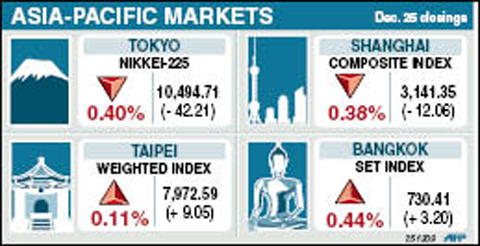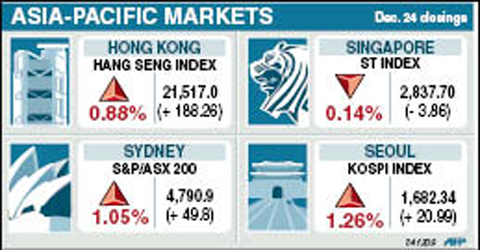Asian stocks advanced this week for the first time in three weeks, led by technology companies and commodity producers on optimism the global economic recovery is strengthening.
Inotera Memories Inc (華亞科技) surged 23 percent in Taipei as prices for dynamic-random-access-memory chips climbed to a one-month high. Canon Inc, the world’s biggest camera maker, gained 5.6 percent in Tokyo after keeping its dividend unchanged and winning approval for a takeover. BHP Billiton Ltd, the world’s largest mining company and Australia’s top oil producer, gained 4.6 percent in Sydney as prices for crude and metals increased after reports showed US consumer spending and incomes climbed.
“The recent data indicate the global economy is recovering faster than originally expected,” said Prasad Patkar, who helps manage about US$1.6 billion at Platypus Asset Management in Sydney. “It’s too early to say whether the recovery is self-sustaining, but we should know toward the end of first quarter 2010.”

The MSCI Asia-Pacific Index rose 1.7 percent to 119.56 this holiday-shortened week. Technology and materials stocks had the steepest gains among the index’s 10 industry groups.
Japan’s Nikkei 225 Stock Average added 3.5 percent this week, Hong Kong’s Hang Seng Index climbed 1.6 percent and the Shanghai Composite Index in China gained 0.9 percent. Japan’s markets were closed on Wednesday for a holiday, and most other bourses were shut on Friday for Christmas.
The MSCI gauge has climbed 34 percent this year, set for its biggest annual gain since 2003, on signs government spending and lower interest rates are bolstering economies.

Stocks in the benchmark trade at 23 times estimated earnings, compared with 18 times for the Standard and Poor’s 500 Index in the US and 16 times for the Dow Jones STOXX 600 Index in Europe.
Inotera Memories surged 23 percent to NT$25.30 in Taipei, the highest since May last year. Elpida Memory Inc, Japan’s biggest maker of memory chips, climbed 12 percent. Tokyo Electron Ltd, the world’s second-biggest maker of equipment to manufacture semiconductors, advanced 9.3 percent to ¥5,880.
Taiwanese share prices are expected to keep their upward momentum amid high liquidity next week, the last in a boom year for the nation’s share market, dealers said on Friday.
Institutional investors are likely to short-cover electronic firms after the sector’s recent consolidation, triggered by a pick-up in the global demand for high-tech products, they said.
For the week to Friday, the weighted index rose 218.96 points or 2.82 percent to 7,972.59 after a 0.53 percent fall a week earlier.

Nvidia Corp yesterday unveiled its new high-speed interconnect technology, NVLink Fusion, with Taiwanese application-specific IC (ASIC) designers Alchip Technologies Ltd (世芯) and MediaTek Inc (聯發科) among the first to adopt the technology to help build semi-custom artificial intelligence (AI) infrastructure for hyperscalers. Nvidia has opened its technology to outside users, as hyperscalers and cloud service providers are building their own cost-effective AI chips, or accelerators, used in AI servers by leveraging ASIC firms’ designing capabilities to reduce their dependence on Nvidia. Previously, NVLink technology was only available for Nvidia’s own AI platform. “NVLink Fusion opens Nvidia’s AI platform and rich ecosystem for

WARNING: From Jan. 1 last year to the end of last month, 89 Taiwanese have gone missing or been detained in China, the MAC said, urging people to carefully consider travel to China Lax enforcement had made virtually moot regulations banning civil servants from making unauthorized visits to China, the Control Yuan said yesterday. Several agencies allowed personnel to travel to China after they submitted explanations for the trip written using artificial intelligence or provided no reason at all, the Control Yuan said in a statement, following an investigation headed by Control Yuan member Lin Wen-cheng (林文程). The probe identified 318 civil servants who traveled to China without permission in the past 10 years, but the true number could be close to 1,000, the Control Yuan said. The public employees investigated were not engaged in national

ALL TOGETHER: Only by including Taiwan can the WHA fully exemplify its commitment to ‘One World for Health,’ the representative offices of eight nations in Taiwan said The representative offices in Taiwan of eight nations yesterday issued a joint statement reiterating their support for Taiwan’s meaningful engagement with the WHO and for Taipei’s participation as an observer at the World Health Assembly (WHA). The joint statement came as Taiwan has not received an invitation to this year’s WHA, which started yesterday and runs until Tuesday next week. This year’s meeting of the decisionmaking body of the WHO in Geneva, Switzerland, would be the ninth consecutive year Taiwan has been excluded. The eight offices, which reaffirmed their support for Taiwan, are the British Office Taipei, the Australian Office Taipei, the

CAUSE AND EFFECT: China’s policies prompted the US to increase its presence in the Indo-Pacific, and Beijing should consider if this outcome is in its best interests, Lai said China has been escalating its military and political pressure on Taiwan for many years, but should reflect on this strategy and think about what is really in its best interest, President William Lai (賴清德) said. Lai made the remark in a YouTube interview with Mindi World News that was broadcast on Saturday, ahead of the first anniversary of his presidential inauguration tomorrow. The US has clearly stated that China is its biggest challenge and threat, with US President Donald Trump and US Secretary of Defense Pete Hegseth repeatedly saying that the US should increase its forces in the Indo-Pacific region